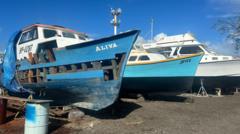In July, Hurricane Beryl struck Barbados with unprecedented force, leaving the fishing industry grappling with significant devastation. The temporary boatyard in Bridgetown is a stark reminder of the hurricane's wrath, showcasing numerous damaged vessels with gaping holes and broken parts. While some boats were salvageable, many others sank, leading to financial hardship for families relying on fishing as their primary income.
Charles Carter, owner of a blue-and-black fishing boat named Joyce, experienced the effects firsthand. "It's had a severe impact," he remarked, showing off his restored vessel that took months and substantial funds to repair. The fishing sector is struggling, with about 75% of the fleet affected and 88 boats lost entirely.
"We're just trying to pick up the pieces," Captain Euride stated, highlighting the uncertainty facing fisheries workers. Six months post-storm, however, rays of hope are emerging. Repaired vessels are gradually being returned to the ocean with government assistance, and the sight of Joyce back at sea brings joy to local fishermen.
Nevertheless, the reality of climate change looms large. Dr. Shelly Ann Cox, the Chief Fisheries Officer, explained that shifts in sea conditions and rising temperatures are complicating fishing efforts, particularly for the valuable flying fish, a staple in Barbadian cuisine.
At the Oistins Fish Market, which remains partially operational, the availability of various fish has reduced, raising concerns for both the fishing and tourism industries. Cornelius Carrington from Freedom Fish House stressed the urgent need for adaptation amidst changing tides and weather patterns.
In schools, awareness of climate change is growing among students. Representatives from the Caribbean Youth Environmental Network (CYEN) engaged students at Harrison College about potential solutions to combat climate issues. Their conversations revealed mixed sentiments, as some expressed skepticism about the difference small nations like Barbados can make without larger contributors stepping up.
The urgency of climate action is echoed by Prime Minister Mia Mottley, advocating for global responsibilities at international forums like COP29. The impacts are palpable; erosion, coral bleaching, and the rising sea levels threaten the very existence of this island community.
Fisherman Steven Bourne, after losing two boats in the storm, shared his observations of rapidly changing coastlines, highlighting the intensified challenges that now characterize everyday life in Barbados. Home Affairs Minister Wilfred Abrahams reinforced the concerns surrounding Caribbean disaster management, citing the unprecedented frequency and intensity of storms as alarming and requiring a cultural shift in preparedness.
In this challenging era, the spirit of Barbadians is unwavering. "There's no escaping this place," Bourne remarked. "We love this rock, and we will always be here."




















